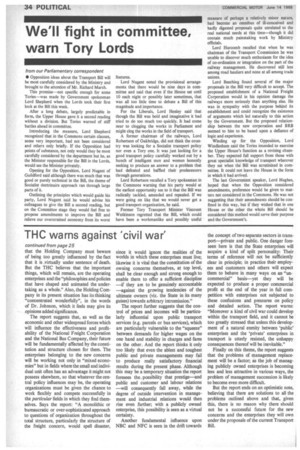We'll fight in committee, warn Tory Lords
Page 36

If you've noticed an error in this article please click here to report it so we can fix it.
from our Parliamentary correspondent • Opposition ideas about the Transport Bill will be most carefully considered by the Ministry and brought to the attention of Mr. Richard Marsh.
This promise—not specific enough for some Tories—was made by Government spokesman Lord Shepherd when the Lords took their first look at the Bill this week.
After a long debate, largely predictable in form, the Upper House gave it a second reading without a division. But Tories warned of stiff battles ahead in committee.
Introducing the measure, Lord Shepherd recognized that in the Commons certain clauses, some very important, had not been considered and others only briefly. If the Opposition had points of substance, not only would they be most carefully considered by the department but he, as the Minister responsible for the Bill in the Lords, would see the Minister privately.
Opening for the Opposition, Lord Nugent of Guildford said although there was much that was good or purely technical in the Bill, the theme of Socialist doctrinaire approach ran through large parts of it.
Outlining the principles which would guide his party, Lord Nugent said he would advise his colleagues to give the Bill a second reading, but on the Committee stage they would feel free to propose amendments to improve the Bill and relieve our overstrained economy from its worst features.
Lord Nugent noted the provisional arrangements that there would be nine days in committee and said that even if the House sat until 10 each night or possibly later sometimes, that was all too little time to debate a Bill of this magnitude and importance.
For the Liberals, Lord Henley said that though the Bill was bold and imaginative it had tried to do too much too .quickly. It had come near to clogging the works in Parliament and might clog the works in the field of transport.
A former chairman of the railways, Lord Robertson of Oakbridge, did not think the country was looking for a Socialist transport policy nor even a Tory one. It was just looking for a good transport policy carefully worked out by a bunch of intelligent men and women honestly seeking to produce an answer to a problem that had defeated and baffled their predecessors through generations.
Lord Robertson recalled a Tory spokesman in the Commons warning that his party would at the earliest opportunity see to it that the Bill was radically tackled, amended and repealed. If we were going on like that we would never get a good transport organization, he said.
Former Tory Transport Minister Viscount Watkinson regretted that the Bill, which could have been a workmanlike and possibly useful measure of perhaps a relatively minor nature, had become an omnibus of ill-conceived and badly digested proposals quite unrelated to the real national needs at this time—though it did contain much painstaking work by Ministry officials.
Lord Hurcomb recalled that when he was chairman of the Transport Commission he was unable to discover much enthusiasm for the idea of co-ordination or integration on the part of the railway management. He discovered still less among road hauliers and none at all among trade unions.
Lord Beeching found several of the major proposals in the Bill very difficult to accept. The proposed establishment of a National Freight Corporation would in his opinion damage the railways more seriously than anything else. He was in sympathy with the purpose behind its establishment and could recognize the existence of arguments which led naturally to this action by the Government. But the proposed relationship between the new corporation and BRB seemed to him to be based upon a defiance of logic and experience.
Winding up for the Opposition, Lord Windlesham said the Tories intended to exercise the Upper House's function as a revising chamber. They expected full support from those with great specialist knowledge of transport wherever they sat when the Bill was scrutinized in committee. It could not leave the House in the form in which it had arrived.
The last Government speaker, Lord Hughes, hoped that when the Opposition considered amendments, preference would be given to matters not considered in the Commons. He was not suggesting that their amendments should be confined in this way, but if they wished that in one House or the other the whole Bill should be considered this method would serve their purpose and the Government's.




























































































































